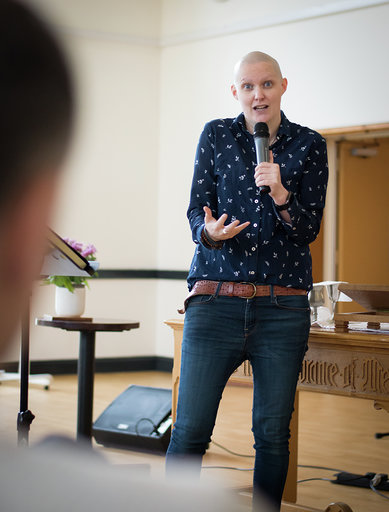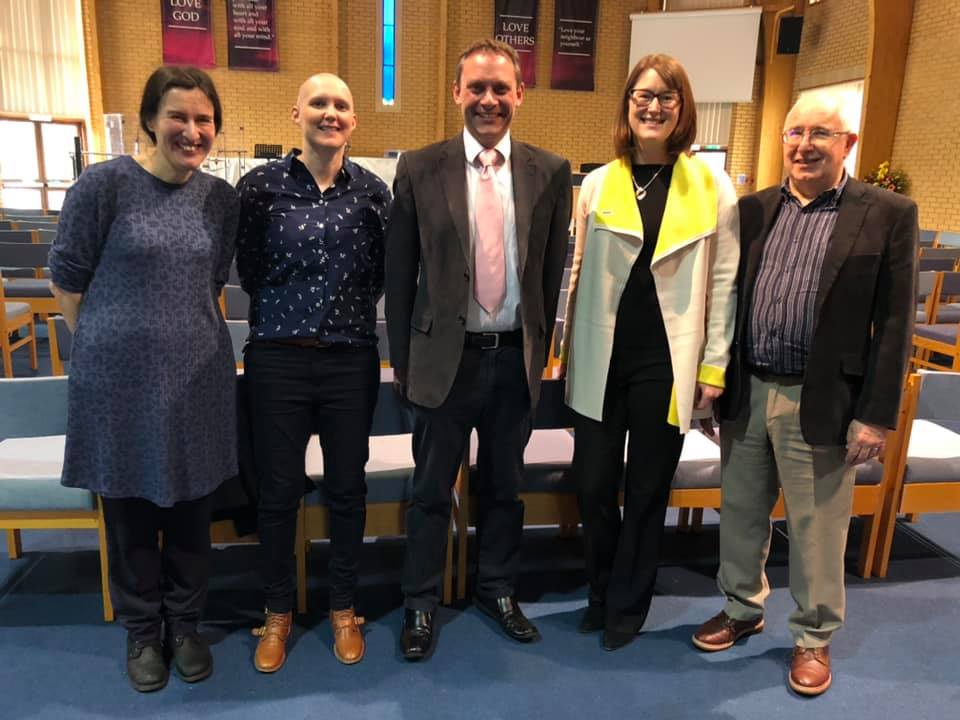'There’s an excitement about what millennials can offer the church'
Hayley Young is the Regional Minister/Mission Enabler at the South Wales Baptist Association. Aged 33, she is currently our youngest regional minister. This interview featured in the Summer 2020 edition of Baptists Together magazine, which had a focus on young adults
 Can you talk us through your call to regional ministry?
Can you talk us through your call to regional ministry?
It was birthed out of a frustration. I felt God was calling people of my age. While Baptists are fantastic in their grass roots nature, I look around at some of the structures and there’s no one like me.
As I wrestled with this, I asked God, “Will you raise more people up into some of these positions?”
And the response I heard very strongly was that He wanted me to go forward. I thought: I haven’t got the right experience, I don’t look like the others. Soon I saw that South Wales were looking.
I was invited to interview. Sceptically I thought I was there just to tick boxes. But God really started moving in my heart that this was right. I had the sense it wasn’t just about my gifts and calling, but to open doors so others can follow.
So what’s your role at SWaBA?
It’s Mission Enabler. What’s really exciting is that I’m coming alongside ministers and churches and seeing what God is already doing. I’m encouraging people to maybe try new things in new ways. There is a real openness.
There are lots of challenges and big questions. How do we transform our services and congregations to meet the needs around them? We need to fundamentally question our theologies.
I’m learning that Wales is very different. Baptist churches here tend to be traditional in the way they do things. Some churches are trying so hard. They have a heart for Jesus, and that’s all they need.
Part of me is feeling not ready and inadequate, but I’m relying on God more and I am excited for all that lies ahead.

Hayley with the South Wales Baptist Association regional team at its induction service in February
How did you come to faith – and how and when did you sense the call to ministry?
I was brought up in a non-Christian household. But when I was 17 I really started questioning things. I was studying history and religion, and during that time I visited Auschwitz. You can’t go to a place like that and not have a load of questions. I looked at Christianity and other faiths.
One day on the way to college, I passed a Baptist church. I just wandered in and spoke to the minister. There was something about him and the way that he responded to my questions that seemed different to anything else I had experienced. I wanted to find out more.
By the time I went to university I was part of a congregation. At this time I just felt God calling me into pastoral ministry. A sermon at the time challenged me: you have to use the gifts that God has given you now. I prayed a lot, fasted a lot. I spoke to Christian friends who said it was a great idea, but that I was too young. I spoke to non-Christian friends who told me to go for it now.
What happened next?
I just started pushing those doors. I did an internship year with a Baptist church, and started going through Ministerial Recognition. One of the things I was asked was: “Do you think you need more worldly experience?” Having become a Christian aged 17, I already felt I had a lot of worldly experience! I said, “I don’t want to grow in worldly experience, but in Godly experience.”
As part of my study at Spurgeon’s, I was placed at Hayling Island, with (fellow Baptist minister) Jacky Storey. When she was called into regional ministry, I stayed, and just flourished.
I’ve had some difficult situations. Some because of my gender, some because of my age. I’ve had some comments about my role, that it’s tokenistic. But the more you work with integrity, and the more you follow Jesus, people will come round to you.
You have a passion for seeing Millennials and Generation Z released into church leadership. Can you talk more about that?
Millennials and Generation Z have the same gifts as others, such as being gifted teachers, anointed preachers. But we also have a unique ability to speak into a rapidly changing culture. We can speak with a prophetic voice.
One example of that was the Living Lent campaign from the Joint Public Issues Team. The amount of millennials who took part was great.
Whenever someone comes to faith, we can speak to their generation. We know what it’s like growing up in these times. We should be releasing more people into that. When that investment is made, society should be able to see there’s people like me, and think “I can relate to that”.
There’s an excitement about what millennials can offer the church.
Can you tell us about the Cardboard Testimony in 2015? What are your reflections on it?
Hayley made a film called Cardboard Testimony to tell her congregation and wider community she was HIV positive, following an attack two years previously. She used words on sheets of cardboard to get the message across. The testimony was picked up by many national news outlets.
I needed to tell the congregation. Lots of people have questioned the method, but I didn’t want anything to be misunderstood, and wanted a tangible reference point. There was also a recognition that our church was wider than those who come on a Sunday morning, so this was for them too.
It was a couple of weeks before the national media picked it up. I think they were tipped off. I was suddenly thrust into a media whirlwind. I had no training for this!
But God was in it, and it was very humbling. It gave me a wonderful opportunity to share the gospel. There wasn’t much to say about HIV, so most of the interviews were actually about?my faith and how it sustained me.
And it has opened doors. I’ve had the privilege of speaking to groups that would never engage with the church; we have HIV and there is a connectedness.
And how about the time you got to share a stage with Bishop Michael Curry, on the very same day he preached at the Royal Wedding?
The local ecumenical partnership contacted me about being part of the service, alongside the Archbishop of Canterbury, Justin Welby. I’m not a traditional minister in any sense, so I thought it was a sign of God’s sense of humour.
I’m also not a royalist, and had not watched the wedding. But I noticed how Michael Curry was trending on Twitter.
To be with him, hear him speak, at the end of a week when Christians had been praying for non-Christians to know about Jesus; there was just this big sense of joy. God’s people worshipping together, being together.
This interview appears in the Summer 2020 edition of Baptists Together magazine
Baptist Times, 22/06/2020